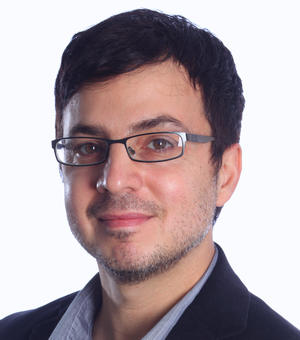Professor Jason Stanyek
Professor Stanyek joined the Faculty of Music in October 2012. He is currently co-editor of the journal Ethnomusicology Forum and is editor of 33 1/3 Brazil, a series of short monographs on Brazilian music that sits alongside Bloomsbury’s long-running 33 1/3 series. He is presently serving as Director of Undergraduate Studies at the Faculty of Music and as Fellow for the Performing Arts at St John’s College.
Before relocating to Oxford, Professor Stanyek was Assistant Professor of Ethnomusicology at New York University and Assistant Professor of Music at the University of Richmond. He has also served as Visiting Associate Professor at Harvard University and External Faculty Fellow at the Stanford Humanities Center. In 2015 he was International Visiting Fellow at RMIT University in Melbourne, Australia.
He received a PhD (Critical Studies and Experimental Practices) from the University of California, San Diego where his supervisor was George E. Lewis. His two previous degrees were in music composition (MA, University of California, San Diego; BM, summa cum laude, Brooklyn College, City University of New York). At Brooklyn College his principal mentors were Tania Léon and H. Wiley Hitchcock.
Professor Stanyek has published on subjects ranging from Brazilian hip hop to Pan-African jazz, from intercultural improvisation to posthumous duets. The two principal strands of his research are music technology and Brazilian music and dance. With Sumanth Gopinath he co-edited The Oxford Handbook of Mobile Music Studies (2 volumes, 2014) and his essay ‘Deadness: Technologies of the Intermundane’(co-written with Benjamin Piekut), received the 2011 ‘Outstanding Essay Award’ from the Association for Theater in Higher Education and was selected by MIT Press/Journals as one of the 50 most influential articles out of the thousands published over the past 50 years in all of their journals across all disciplines.
His research on Brazilian music can be found in a number of journals and edited volumes. He co-edited (2011) an interdisciplinary issue of the journal Critical Studies in Improvisation titled ‘Brazilian Improvisations / Improvisações Brasileiras’ and his monograph on Brazilian diasporic performance and a co-edited volume (with Frederick Moehn) on the history of bossa nova in the United States are forthcoming. He was guest producer for an hour-long radio show called ‘The Brazilian Diaspora in the United States’ for Public Radio International’s long-running programme Afropop Worldwide (available online here) and appeared on BBC Four’s television special on the history of bossa nova. He was a long-time member of the faculty at the California Brazil Camp in Cazadero, California, where he taught pagode and cavaquinho.
He has given invited lectures at a number of universities in Europe, Latin America, Asia, and the US and he has delivered a range of international conference keynote lectures, including for Sound in Motion (University of Bern); The Sixth Rhythm Changes Conference: Jazz Journeys (University of Graz); Improvisation as Intercultural Contact and Dialogue (Memorial University of Newfoundland); Music, Digitisation, Mediation (University of Oxford); Functional Sounds: The First International Conference of the European Sound Studies Association (Berlin); and Music-Culture Trends: Business, Aesthetics, Language, and Audibilities (Federal Fluminense University, Rio de Janeiro).
He currently sits on the Executive Committee of the British Forum for Ethnomusicology and between 2012 and 2015 he served on the Council of the Society for Ethnomusicology. Beyond his current roles as co-editor of the journal Ethnomusicology Forum and the Bloomsbury series 33 1/3 Brazil, he was formerly co-editor of the Cambridge UP journal Twentieth-Century Music and was Multimedia Reviews Editor of the Journal for the Society of American Music. He also serves on the editorial board of the journal Sound Studies and is a member of the advisory board of the journal Critical Studies in Improvisation. Since 2007 he has been a researcher on the international team of a major collaborative project entitled ‘Improvisation, Community, and Social Practice’ (funded by the Social Sciences and Humanities Research Council of Canada).
As a teacher he gives graduate seminars and undergraduate classes on Brazilian music, sonic culture, critical theory, global hip hop, musics of the African diaspora, world music, new media, ethnographic method, and the history of ethnomusicology. He has won teaching awards from the Cross-Cultural Center at the University of California, San Diego and for the 2012-2013 academic year he was the recipient of a Humanities Teaching Excellence Award from the University of Oxford.
He was long active as a performer and composer, serving as assistant conductor for the premiere recording of Anthony Davis’s opera Tania and releasing two CDs as a guitarist with the quartet O’Keefe, Stanyek, Walton, Whitehead (including Tunnel, which appeared on a number of year-end best-of lists, including those in The Wire and L.A. Weekly). He played cavaquinho and berimbau on the CD Da Rua Dos Ossos by Juju Duarte (Art Hurts, 2006). Professor Stanyek’s compositions have been performed worldwide and he has composed music for dance productions and films (including for Thomas Allen Harris’s É Minha Cara/That’s My Face: A Mythopoetic Film Exploring the African Face of Brazil).
At Oxford he is the convener of the Seminar in Ethnomusicology and Sound Studies, and was formerly co-organizer of the Global Brazil Network and academic director of the Humanitas Professorship in Classical Music and Music Education.
Research interests in Brazilian music, sound studies, music technology, hip hop, posthumous duets, jazz, music and diaspora, ethnography, critical theory, improvisation.




